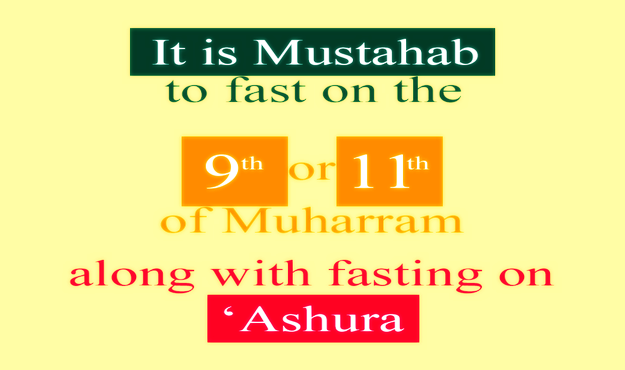In the name of Allah, the Most Merciful, the Bestower of Mercy
A Concise Article on Fasting the Day of ‘Ashura
Its Virtue:
Abu Qatadah (radhiAllahu anhu) narrated that the Prophet (Sallallahu alayhi wassallam) was asked about ‘Ashura and he responded,
“It expiates for the previous year.” [Muslim, 1162]
Ibn ‘Abbas (radhiAllahu anhu) said,
“I never saw the Prophet (Sallallahu alayhi wassallam) seeking to fast a day, giving it preference over another, except this day, the day of ‘Ashura, and this month, meaning the month of Ramadan.” [Bukhari, 2006]
It is the Day Allah Saved Musa
Ibn ‘Abbas (radhiAllahu anhu) said,
“The Prophet (Sallallahu alayhi wassallam) came to al-Madinah and saw the Jews fasting on the day of ‘Ashura. He asked, ‘What is this?’ They responded, ‘This is a virtuous day, as this is the day when Allah saved the Children of Isra’il from their enemy. Thus, Musa fasted on this day.’ He said, ‘We have more right to Musa than you.” So he fasted on this day and ordered the [people] to fast.” [Bukhari, 2004]
The Prophet (Sallallahu alayhi wassallam) did not begin to fast the day of ‘Ashura, imitating the People of the Book as the Prophet (Sallallahu alayhi wassallam) would fast it prior to his arrival in al-Madinah [Sahih Muslim no. 1125]
There comes in the narration in Sahih Muslim,
“This is a great day in which Allah saved Musa and his people and drowned Fir’awn and his people.”
Its Ruling
Al-Imam al-Nawawi (rahmatullahi) stated,
“The scholars unanimously agree that fasting the day of ‘Ashura is a Sunnah and not an obligation.” [Sharh Muslim (8/4)]
It is the 10th of Muharram
The majority of scholars hold that ‘Ashura is on the 10th of Muharram. Al-Qurtbi mentioned that the word ‘Ashura is derived from ‘ashirah (the tenth) and it is on the pattern of ![]() which is used to signify intensiveness and esteem. This position is supported by the hadith of Ibn ‘Abbas (radhiAllahu anhu) who said,
which is used to signify intensiveness and esteem. This position is supported by the hadith of Ibn ‘Abbas (radhiAllahu anhu) who said,
“When the Messenger of Allah (Sallallahu alayhi wassallam) fasted on ‘Ashura and commanded the Muslims to fast as well, they said, ‘O Messenger of Allah (Sallallahu alayhi wassallam), it is a day that is venerated by the Jews and Christians.’ The Messenger of Allah (Sallallahu alayhi wassallam) said, ‘If I live to see next year – if Allah wills – we will also fast on the ninth day.’ However, it occurred that the Messenger of Allah (Sallallahu alayhi wassallam) passed away before the next year came.” [Muslim, 1134, as for the hadith with the wording, “If I was to remain, then I would command you to fast a day before or a day after ‘Ashura,” then Shaykh Albani declared it to be weak in al-Da’ifah (no. 4297)]
The Three Ways to Fast ‘Ashura
Al-Imam Ibn al-Qayyim (rahmatullahi) stated in Zad al-Ma’ad (pg. 72):
“There are three levels of fasting ‘Ashura. The most complete is to fast a day before it and a day after it. After this is to fast the 9th and the 10th, and the majority of ahadith [are found to support this]. Lastly, to fast the 10th by itself.”
Al-hafiz Ibn hajr (rahmatullahi) mentioned in al-Fath:
“Fasting ‘Ashura is of three levels:
- The lowest is to fast it alone.
- Above this is to fast the 9th along with it.
- Above that is to fast the 9th and the 11th along with it. [As for the hadith collected by Ibn Khuzaimah (no. 2095) where it is narrated that the Prophet (Sallallahu alayhi wassallam) said: “Fast the day of ‘Ashura; and oppose the Jews. Fast the day before it or the day after it,” then Shaykh Albani declared this hadith to be weak due to the narrator Ibn Abu Layla, who is weak, and also the fact that he was opposed by ‘Ata and others who narrated it from Ibn ‘Abbas in the Mawquf form (which is a narration from a companion). It is authentically transmitted from Ibn ‘Abbas that he said concerning ‘Ashura: “Oppose the Jews and fast the ninth and the tenth.” Collected by ‘Abd al-Razzaq (no. 7839) in al-Musannaf (4/287).] And Allah knows best.” [(4/246)]
Fasting ‘Ashura if it Coincides with Saturday
The Prophet (Sallallahu alayhi wassallam) said:
“‘Do not fast on Saturday except for what Allah has made obligatory upon you. If one of you does not find anything but the peel of a grape or the twig of a tree, then let him chew on it.” [Tirmidhi (no. 744) and others. Shaykh Albani declared this hadith to be sound. A number of the scholars of hadith held this narration to be odd [Shadh] and inconsistent [Mudtarib]; this was the stance of Shaykh Ibn Baz and others from this time. Even if it assumed the hadith is sound, then it is understood in light of the other narrations; and the understanding of the Salaf has precedence.]
Al-Tirmidhi said:
“This hadith is sound (hasan). The meaning of dislike here is for a man to single out Saturday with the Fast, because the Jews revere Saturday.”
From the proofs that support the stance of Imam al-Tirmidhi is the hadith:
The Prophet (Sallallahu alayhi wassallam) said:
“None of you should fast Friday unless [he fasts] a day before it or after it.” [Bukhari (no. 1985) and Muslim (no. 1144)]
Shaykh Ibn al-‘Uthaymin
“The Third Case: When Saturday coincides with the legislated fasts like the three white days of the month [the 13th, 14th and 15th], the day of ‘Arafah, the day of ‘Ashura, the six days of Shawal for the person who has fasted the month of Ramadan, and the nine days of Dhu al-hijjah, then it is allowed [to fast on this day]. This is because they did not fast it due to it being Saturday, but because it is from the days that it is legislated to fast.” [Majmu’ al-Fatawa (20/37)]
Some Innovations Practiced on ‘Ashura
Shaykh al-Islam Ibn Taymiyah (rahmatullahi) was asked about things that people do on the day of ‘Ashura like wearing kuhl, bathing (ghusl), wearing henna, shaking hands, cooking special dishes prepared from grains, and displaying delight and the like of these things in the street. Is any of this transmitted in an authentic hadith from the Prophet (Sallallahu alayhi wassallam) or not? Is there any basis for what is practiced by the other sect such as [their manifestation of] grief, wailing and bawling, induced thirst, reciting in a possessed fashion and tearing the pockets [from the garments]?
He (rahmatullahi) replied, “All praise is due to Allah, the Lord of all creation. There is not an authentic hadith concerning any of these things from the Prophet nor from his Companions; and none of the Imams of the Muslims recommended these things, not the four Imams nor other than them. None of the scholars who compiled the classical books [of narrations] narrated anything related to this, not from the Prophet (Sallallahu alayhi wassallam) nor from the Companions nor from their students. They did not narrate anything concerning this, not an authentic narration nor a weak narration; not in the authentic collections nor the Sunan nor the Musnads. None of these ahadith were known throughout the praiseworthy generations. However, some of the later generations narrated ahadith like, ‘Whoever wears kuhl on their eyes on the day of ‘Ashura will not suffer from an eye ailment that year,’ and ‘Whoever bathes (ghusl) on the day of ‘Ashura will not get sick that year,’ and the like of this…” [Majmu’ al-Fatawa (25/299)]
 navedz.com a muslim's Quest for the truth
navedz.com a muslim's Quest for the truth









